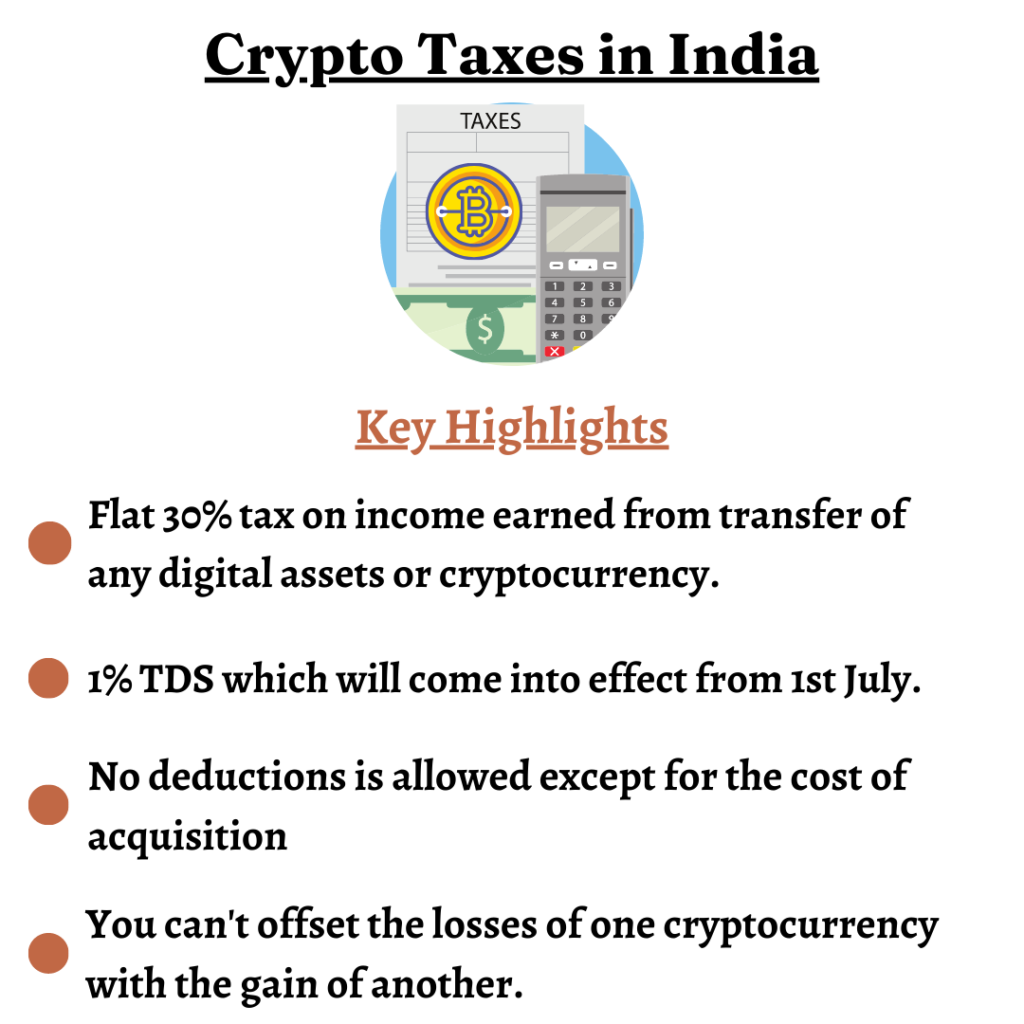Crypto Taxes in India: The Complete Tax Guide
This is how crypto taxes in India works –
30% tax on income earned from the transfer of any digital assets or cryptocurrency. Plus, 1% TDS.

While presenting the Union Budget of 2022, Finance Minister Nirmala Sitharaman announced the new crypto tax laws. The announcement was followed by harsh criticism from many influential figures and industry leaders.
The criticism – the new crypto tax regulations are not only strict but very shortsighted and inflexible. We’ll discuss why later in this article.
Experts also warn that this new tax law will stop the crypto industry from growing in India and force traders and investors to migrate to a more crypto-friendly country.
How Does the Income Tax Department of India View Crypto?
There’s still no official statement by the IT department of India on whether they view cryptocurrency and NFTs as assets or currency.
Though, based on the language used to describe crypto taxes in India, it’s safe to assume that they view crypto as assets.
Legal Status of Crypto in India
Despite releasing proper guidelines on crypto taxes in India, the Indian government still refuses to give crypto a legal status, which is another point of criticism from the crypto community.
Is Crypto Taxable in India?
Yes, crypto is taxable in India. There are two kinds of crypto taxes in India –
1. Flat 30% tax on income earned from transfer of any digital assets or cryptocurrency, which came into effect from 1st April.
2. 1% TDS which will come into effect from 1st July.
How to Calculate Crypto Taxes in India?
This is how you calculate gains on crypto –
Sale Consideration – Cost of Acquisition = Gains
Sale consideration refers to the price you sold your crypto for.
Cost of acquisition refers to the price you bought it for.
And the difference between the two is, of course, the gain.
You’ll pay a flat 30% on all your gains. Also, you can’t deduct any costs or expenses from your crypto taxes, except for the cost of acquisition.
What’s worse is that you can’t offset the losses of one digital asset for another. So, if you sell Bitcoin and incur a loss, you can’t use that loss to offset gains you incur from a different cryptocurrency like Ethereum.
You can only offset Bitcoin losses for Bitcoin gains, Ethereum losses for Ethereum gains, etc.
But that’s not all. The real accounting disaster starts with the 1% TDS.
How does the TDS work?
When selling a crypto asset, the buyer must deduct the 1% TDS on behalf of the seller, but only if the total transaction value exceeds ₹10,000 or ₹50,000 in total transaction value over a full financial year.
The 1% TDS is refundable if you incur a loss, but only after reporting your yearly taxes.
As you can imagine, this makes it extremely difficult for traders to trade on a high frequency. Plus, there’s no way for DeFi platforms to comply with this tax reporting requirement, as DeFi exchanges are inherently anonymous and have no central authority.
The regulatory institutions responded to the criticism by saying they levied the 1% TDS to track transactions.
Crypto Taxable Events in India

The following are some common crypto transactions and their tax consequences.
Taxes on Getting Paid in Crypto in India
If you’re getting paid in crypto for selling any products or services, it’ll also come under income earned from the transfer of digital assets. Therefore, you’ll pay a 30% tax rate on your income.
It seems unfair, as it should be taxed under income taxes. But that’s how crypto taxes in India work.
Taxes on Gifting Crypto in India
Once again, if someone receives a gift in the form of crypto, the recipient will be liable for paying a 30% tax on it.
Taxes on Swapping Crypto in India
Guidelines on taxes on swapping crypto or trading one cryptocurrency for another is still unclear. But from what we have so far, it seems that it’s a taxable event.
Similar to crypto taxes in the US, when you’re trading one crypto for another, you’re essentially disposing of your crypto.
So, if you trade Bitcoins for Ethereum and realize a gain, you’ll have to pay the 30% tax rate. On top of this, every time you swap one crypto for another, you’ll also be liable for the 1% TDS, which just makes it even more complicated.
Tax-Free Crypto Transactions in India
Holding crypto and transferring crypto between different wallets are not taxable.
How to Avoid Crypto Taxes in India?
First of all, if the government has released clear guidelines on crypto taxes in India, avoiding it means you’re committing a crime. So, the right thing to do is pay your taxes honestly and accurately.
That being said, it’s still worth discussing how a few loopholes in the crypto taxation laws in India may allow some people to avoid taxes.
How?
With the help of DeFi platforms. Since DeFi exchanges allow anonymity and have no central authority tracking your transactions, avoiding taxes with DeFi platforms seems plausible.
However, it only looks good in theory. In practice, there’s a huge roadblock.
Crypto is not a legal tender in India, so you can’t use it for daily transactions. Plus, most shop owners and vendors in India don’t accept cryptocurrency or Bitcoin yet. So at some point, you have to convert your crypto into fiat currency.
So, even if you escape the 1% TDS. You’ll still have to pay the 30% tax rate.
How to Pay Crypto Taxes in India?
You can file and pay your crypto taxes in India the same way you do your income taxes every year. The only difference is that crypto won’t be taxed at the same tax rates as income taxes.
If you’re a crypto trader or investor and all of this sounds too confusing for you, consider using Bitcoin.Tax.
Bitcoin.Tax automatically collects all your transactions, calculates your taxes, and creates a tax report for you, while you can just sit back and relax.